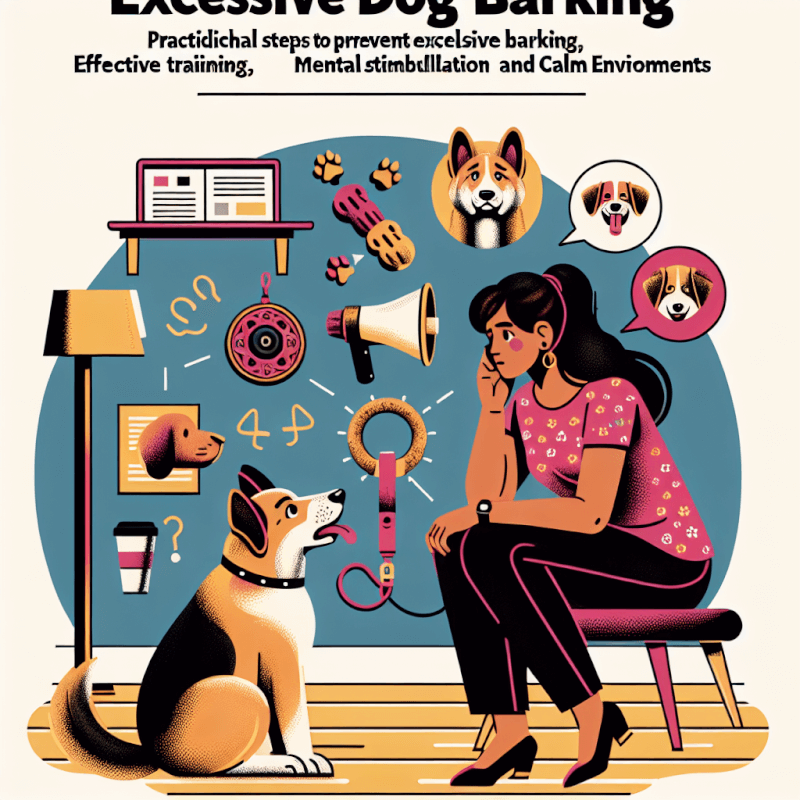Are you tired of incessant barking from your furry companion? Well, fret not, as we bring you the ultimate guide to preventing your beloved dog from barking excessively. From understanding the root causes of their barks to implementing effective training techniques, we’ve got you covered. Say goodbye to those sleepless nights and hello to a more peaceful and harmonious living environment with your four-legged friend. Let’s explore the simple yet practical solutions that will ensure a quieter and happier home for both you and your fur baby.

Train Your Dog
Teach the ‘Quiet’ Command
Training your dog to understand the ‘quiet’ command is an effective way to prevent excessive barking. Start by teaching your dog the ‘speak’ command. Once your dog can bark on command, introduce the ‘quiet’ command by saying it in a calm but firm tone when your dog starts barking. When your dog stops barking, reward them with a treat and praise. Repeat this exercise, gradually increasing the duration of quietness before giving a reward. Consistency and positive reinforcement are key in helping your dog understand the ‘quiet’ command.
Ready for Cat Trivia?
Test your knowledge about cats!

Reward Good Behavior
Positive reinforcement is a powerful tool in dog training. Whenever your dog exhibits good behavior by not barking excessively, reward them with treats, praise, or even a special toy. This positive reinforcement will reinforce the idea that being quiet is a desirable behavior. Make sure to reward your dog immediately after they stop barking to create a strong association between the behavior and the reward.
Ignore the Barking
In some cases, dogs bark excessively to get attention. By ignoring your dog’s barking, you avoid rewarding them with attention for their unwanted behavior. This may be difficult at first, as your dog might try to get your attention by barking louder or more persistently. However, it’s important to stay consistent and wait for a moment of quietness before providing attention or rewards. By not reinforcing the barking, your dog will eventually learn that quiet behavior is more productive in getting your attention.
Use Positive Reinforcement
Positive reinforcement training methods are the most effective and humane ways to train your dog. These methods involve rewarding desired behaviors and ignoring or redirecting unwanted behaviors. By focusing on what your dog is doing right and rewarding them for it, you create a positive learning environment. Positive reinforcement can be used in conjunction with the ‘quiet’ command, rewarding your dog when they stop barking on command. With consistent use of positive reinforcement, your dog will be motivated to behave in a way that earns rewards.
Enroll in Obedience Classes
Obedience classes can be incredibly beneficial in preventing excessive barking. These classes teach your dog basic commands and help them become more obedient and well-behaved overall. Through obedience classes, your dog will learn how to listen and follow instructions, including commands to be quiet. Trained professionals will guide you and your dog, providing you with the necessary tools and techniques to train your dog effectively. Obedience classes also provide an opportunity for your dog to socialize with other dogs, which can help reduce anxiety and excessive barking.
Identify the Cause of Excessive Barking
Loneliness or Boredom
Dogs are social animals and thrive on companionship. If your dog is barking excessively, they may be feeling lonely or bored. Dogs left alone for long periods without sufficient mental or physical stimulation can become anxious and resort to barking as a way to alleviate their boredom. To address this issue, make sure your dog has plenty of toys and activities to keep them entertained while you’re away. Consider using interactive toys, puzzle toys, or treat dispensers that require your dog to problem-solve and work for their treats. Additionally, arranging for a dog walker, doggy daycare, or playdates with other dogs can help alleviate loneliness and provide much-needed social interaction.
Territoriality
Some dogs bark excessively when they feel their turf is being intruded upon. This territorial behavior can be triggered by strangers approaching your home or even other dogs passing by. To address this issue, minimize your dog’s exposure to potential triggers. Close blinds or curtains to limit their view of the outside, especially if your dog barks at people or animals passing by the windows. You can also create a designated safe space for your dog where they feel secure and have limited access to windows. Additionally, work on desensitizing your dog to these triggers by gradually exposing them to the stimuli in a controlled and positive manner.
Anxiety or Fear
Anxiety and fear can manifest in excessive barking as a coping mechanism. Dogs with separation anxiety may bark excessively when left alone, while dogs with generalized anxiety or specific phobias may bark in response to triggers such as thunderstorms or fireworks. If you suspect anxiety or fear is the cause of your dog’s excessive barking, consult with a professional dog trainer or behaviorist. They can provide guidance on desensitization or counterconditioning exercises to help your dog become more comfortable and confident in anxiety-provoking situations. Additionally, your vet may recommend behavioral medications or natural supplements to help manage your dog’s anxiety.
Medical Issues
In some cases, excessive barking may be a symptom of an underlying medical issue. Pain, discomfort, or illness can cause your dog to bark more than usual. If your dog’s barking is sudden, persistent, or accompanied by other concerning signs like lethargy or loss of appetite, it’s important to consult with your veterinarian. They can conduct a thorough examination and possibly recommend diagnostic tests to rule out any medical conditions. Treating the underlying medical issue may alleviate the excessive barking.
Attention Seeking
Dogs are naturally attention-seeking creatures, and some may resort to barking as a way to get your attention. If your dog barks excessively when you’re around, they may simply be craving interaction and playtime. To address this, provide regular mental and physical stimulation through activities like walks, playtime, and training sessions. Engaging in activities that require your dog to use their brain, such as puzzle toys or obedience training, can tire them out mentally and make them less prone to excessive barking.
Provide Adequate Exercise and Mental Stimulation
Walk Your Dog Regularly
Regular exercise is crucial for a dog’s physical and mental well-being. Taking your dog for daily walks not only helps burn off excess energy but also provides them with important mental stimulation. During walks, your dog can explore their surroundings, encounter new sights and smells, and engage with their environment. This sensory enrichment helps satisfy their natural instincts and can reduce boredom-related barking. Aim for at least one or two walks per day, depending on your dog’s age, breed, and energy level. Be sure to use a comfortable leash and harness, and allow your dog to sniff and explore within safe boundaries.
Engage in Playtime
Playtime is essential for keeping your dog mentally and physically active. Engage in regular play sessions with your dog, incorporating games like fetch, tug-of-war, or hide-and-seek. Interactive play not only helps burn off energy but also strengthens the bond between you and your dog. Use toys that are safe and appropriate for your dog’s size and breed, ensuring they can’t be easily destroyed or swallowed. Rotate toys regularly to prevent boredom, and keep play sessions structured with clear start and end cues. This way, your dog will learn to anticipate and enjoy designated playtimes rather than resorting to excessive barking.
Use Puzzle Toys or Treat Dispensers
Puzzle toys and treat dispensers are excellent tools for providing mental stimulation and keeping your dog entertained. These toys require your dog to problem-solve and work for their rewards, which can prevent boredom and reduce excessive barking. Fill puzzle toys with treats or kibble and let your dog figure out how to release the treats. Treat dispensers can be used during mealtime to make feeding more engaging and challenging. By incorporating these toys into your dog’s routine, you can give them an outlet for their natural instincts and keep their minds occupied, reducing the likelihood of excessive barking.
Create a Positive Environment
Reduce Triggers
Identify what triggers your dog’s excessive barking and take steps to reduce their exposure to those triggers. If your dog barks at people passing by the window, close the blinds or use frosted or opaque window coverings to limit their view. If they react to sounds outside, consider using soundproof curtains or playing soothing background noise to drown out the external sounds. By minimizing or eliminating triggers, you can help create a more serene environment for your dog, reducing their urge to bark excessively.
Limit Access to Windows
Windows often provide dogs with a clear view of the outside world, triggering territorial or protective behavior. If excessive barking is an issue, consider limiting your dog’s access to windows. Use baby gates or close doors to keep them away from windows during times when excessive barking is more likely, such as when the mail carrier or delivery person comes. Redirecting your dog’s attention away from potential triggers can be an effective way to prevent unwanted barking.
Desensitize Your Dog
Desensitization involves gradually exposing your dog to the stimuli that typically trigger their excessive barking in a controlled and positive manner. For example, if your dog barks at visitors, start by having a friend or family member come by and stand outside the door without entering. Reward your dog for being calm and gradually increase the level of exposure over time. By repeatedly exposing your dog to the trigger without causing fear or arousal, you can help them develop a more relaxed response and reduce excessive barking.
Use Background Noise or Music
Background noise or soothing music can help create a more serene environment and mask external sounds that trigger excessive barking. Play calming music or use white noise machines to provide a constant, low-level sound that can help drown out noises from outside. This can be particularly beneficial if your dog becomes anxious or overly alert to sounds like sirens, doorbells, or other dogs barking. The background noise can help your dog relax and lower their reactivity, reducing the likelihood of excessive barking.
Create a Safe Space
Having a designated safe space where your dog can retreat to when they feel anxious or overwhelmed can be incredibly helpful in reducing excessive barking. This space can be a crate, a dog bed in a quiet corner, or a specific room you designate as their safe haven. Make sure the area is comfortable and stocked with familiar toys, blankets, or clothing items that have your scent. Encourage your dog to use this space by providing treats and praise when they choose to relax there. By offering them a safe and secure place, you can help alleviate anxiety and reduce the need for excessive barking.

Avoid Punishment or Yelling
Stay Calm and Patient
Dealing with excessive barking can be frustrating, but it’s important to remain calm and patient. Yelling at or punishing your dog for barking can actually make the problem worse. Dogs respond best to positive reinforcement and clear communication. Losing your temper or reacting emotionally may only increase their anxiety or reinforce the idea that barking gets attention. Take a deep breath, remind yourself that excessive barking is a behavioral issue that can be resolved, and approach training with a positive mindset.
Avoid Reacting Emotionally
Dogs are highly perceptive creatures and can pick up on your emotions. If you become anxious or frustrated in response to their barking, they may perceive it as reinforcement or a reason to be on high alert. Instead, maintain a calm and composed demeanor when your dog is barking excessively. This will help reassure them that there is no imminent danger and that quiet behavior is more desirable. By staying emotionally neutral, you create an environment that promotes relaxation and discourages excessive barking.
Use Positive Training Methods
Positive training methods are proven to be the most effective and humane way to train your dog. These methods involve rewarding desired behaviors and redirecting or ignoring unwanted behaviors. Positive reinforcement can be used to teach the ‘quiet’ command, as well as to reward your dog for good behavior. Instead of scolding or punishing your dog for barking excessively, focus on reinforcing moments of silence and teaching alternative behaviors. By using positive training techniques, you build a stronger bond with your dog and help them understand what is expected of them.
Seek Professional Help if Needed
If your dog’s excessive barking persists despite your efforts or if you feel overwhelmed and unsure about how to address the issue, don’t hesitate to seek professional help. A professional dog trainer or behaviorist can assess your dog’s behavior, identify the underlying causes of excessive barking, and provide you with tailored strategies to address the problem. They can guide you through the training process and ensure that you are using the most effective techniques for your specific situation. Professional help can make a significant difference in managing and reducing excessive barking.
Provide Distractions and Redirect Attention
Implement ‘Quiet’ Toys or Chew Items
To help distract your dog from barking excessively, provide them with toys or chew items specifically designed to keep them occupied and mentally engaged. Interactive toys that require problem-solving, such as puzzles or treat-dispensing toys, can redirect your dog’s attention away from barking and onto the task at hand. Chew toys are also beneficial, as they provide an outlet for your dog’s natural chewing instincts and help relieve anxiety. By offering appropriate distractions, you can redirect your dog’s attention and prevent excessive barking.
Teach ‘Speak’ and ‘Quiet’
Teaching your dog to bark on command and then teaching them the ‘quiet’ command can be an effective way to redirect their attention and control excessive barking. Start by teaching your dog to bark on command. When they bark naturally, say the word “speak” and reward them. After they learn to bark on command, introduce the ‘quiet’ command by saying it when they are barking. Reward them when they stop barking and use a calming tone of voice. Repeat this training in various situations to improve your dog’s responsiveness to the commands. With consistent training, your dog can learn to control their barking.
Redirect Focus with Training Commands
Redirecting your dog’s attention away from excessive barking by giving them a command can be an effective technique. Train your dog with basic obedience commands such as “sit” or “down” and use these commands when they start barking excessively. By redirecting their focus onto a known command, you shift their attention away from barking and onto the desired behavior. This technique can also help reinforce your dog’s training and strengthen their responsiveness to your commands.

Consider Anti-Barking Aids
Ultrasonic or Citronella Collars
Ultrasonic or citronella collars are tools that can help interrupt excessive barking. Ultrasonic collars emit a high-pitched sound that is audible to dogs but not to humans, serving as a distraction and deterring barking. Citronella collars release a harmless burst of citronella spray when the dog barks, providing a sensory deterrent. These collars should be used as a last resort and under the guidance of a professional if other training methods have been unsuccessful. It’s important to note that anti-barking collars should never be used as a substitute for proper training, and their use should be temporary.
Deterrent Devices
Deterrent devices can be used to discourage excessive barking without the need for collars or other physical interventions. These devices often emit sounds, vibrations, or bursts of air when triggered by barking. They are designed to startle and interrupt your dog’s barking, redirecting their attention. Deterrent devices can be placed strategically around your home or used outdoors to discourage barking at triggers such as neighboring dogs or wildlife. Like anti-barking collars, these devices should be used as a temporary measure while you work on training your dog to reduce excessive barking.
White Noise Machines
White noise machines can help mask external sounds that might trigger excessive barking. They emit a constant, soothing sound that can drown out noises like sirens, barking dogs, or other environmental sounds. By providing a consistent background noise, white noise machines help create a more serene environment, reducing your dog’s urge to bark. Place the white noise machine in a central area of your home or near your dog’s sleeping area to provide maximum benefit.
Pheromone Diffusers
Pheromone diffusers emit synthetic versions of calming pheromones that mimic the natural scents produced by nursing mother dogs. These pheromones have a calming effect on some dogs and can help reduce anxiety-related barking. Diffusers can be placed in areas where your dog spends the most time, such as the living room or bedroom. The calming scents can help create a more relaxed environment, alleviating stress and reducing the likelihood of excessive barking. Consult with your veterinarian to determine if pheromone diffusers may be beneficial for your dog’s specific needs.
Consult with a Vet
Rule Out Medical Causes
If your dog’s excessive barking continues despite your efforts to address it, it’s important to consult with your veterinarian to rule out any medical causes. Underlying medical conditions, such as pain, discomfort, or cognitive decline, can manifest as increased vocalization. During a veterinary examination, your vet can conduct a thorough physical examination, assess your dog’s overall health, and ask questions about their behavior and barking patterns. Diagnostic tests may be recommended to identify any underlying medical issues that need to be addressed.
Discuss Medication or Supplements
In some cases, medication or natural supplements may be necessary to help manage excessive barking related to anxiety or other behavioral issues. If your veterinarian determines that medication or supplements may be beneficial, they can discuss the available options with you. Medication should always be used under the guidance of a veterinarian and in conjunction with behavioral modification techniques. The goal is to alleviate your dog’s distress and provide them with a better quality of life, while also addressing the underlying causes of their excessive barking.
Seek Professional Advice
If you’re struggling to manage your dog’s excessive barking despite your best efforts, consider seeking professional advice from a dog trainer or behaviorist. These professionals specialize in assessing and modifying canine behavior, and their expertise can be invaluable in addressing complex issues. They will work closely with you to understand the underlying causes of your dog’s excessive barking and develop a tailored training plan. With their guidance, you can overcome the challenges and help your dog become a more balanced and contented companion.

Create a Consistent Routine
Establish Regular Feeding Times
Creating a consistent routine for your dog can help reduce anxiety and provide them with a sense of predictability. Establish regular feeding times and stick to them as closely as possible. By feeding your dog at the same times each day, they will come to expect it and won’t become anxious or frustrated. Regular mealtimes can also help tire your dog out physically, making them less prone to excessive barking.
Set a Daily Exercise Schedule
Consistency is key when it comes to exercise. Set a daily exercise schedule for your dog and make sure to follow it. Depending on your dog’s age, breed, and energy level, aim for at least 30 minutes to an hour of exercise every day. This can include walks, playtime, or any activity that gets them moving and engaged. Exercising your dog regularly not only helps prevent boredom-related barking but also promotes overall physical and mental well-being.
Maintain a Bedtime Routine
A consistent bedtime routine can help your dog wind down and prepare for a good night’s sleep. Just like humans, dogs benefit from a regular sleep schedule. Establish a routine that includes calming activities such as a walk, quiet playtime, or a calming massage. Provide your dog with a comfortable sleeping area, free from distractions or excessive light. By maintaining a consistent bedtime routine, you can help your dog relax, reduce nighttime restlessness, and minimize excessive barking during the night.
Be a Responsible Dog Owner
Provide Basic Needs
As a responsible dog owner, it’s crucial to ensure that your dog’s basic needs are met. This includes providing them with a balanced diet, fresh water, and a clean and safe living environment. Make sure your dog receives regular veterinary care, including vaccinations, parasite prevention, and annual check-ups. Provide them with appropriate grooming and maintain good hygiene to prevent discomfort or health issues. Meeting your dog’s basic needs ensures their overall well-being, which can help reduce stress and minimize excessive barking.
Socialize Your Dog Properly
Proper socialization is vital for a well-adjusted and well-behaved dog. Expose your dog to various people, animals, environments, and situations from a young age. This exposure helps them become familiar with different stimuli and reduces their likelihood of reacting with fear or excessive barking. Attend obedience classes or enroll in socialization programs to ensure your dog has positive experiences with other dogs and learns appropriate behaviors. Socialized dogs are generally more confident and less prone to fear-based or territorial barking.
Avoid Excessive Solo Confinement
Dogs are social animals and thrive on companionship and stimulation. Avoid leaving your dog alone for long periods or confined to a small space without engaging activities. Excessive solo confinement can lead to boredom, anxiety, and increased barking. If you have to be away for an extended period, consider hiring a dog sitter, enrolling your dog in daycare, or arranging for a trusted family member or friend to spend time with your dog. Providing regular companionship and mental stimulation can help prevent excessive barking stemming from loneliness or boredom.
By following these strategies and tips, you can effectively prevent your dog from barking excessively. Remember to approach training with patience and consistency, using positive reinforcement methods. Understand the underlying causes of excessive barking and address them accordingly. When necessary, seek professional help to ensure you have the guidance and support needed to manage the issue. With time, effort, and a positive approach, you can create a more peaceful and harmonious environment for both you and your furry friend.



